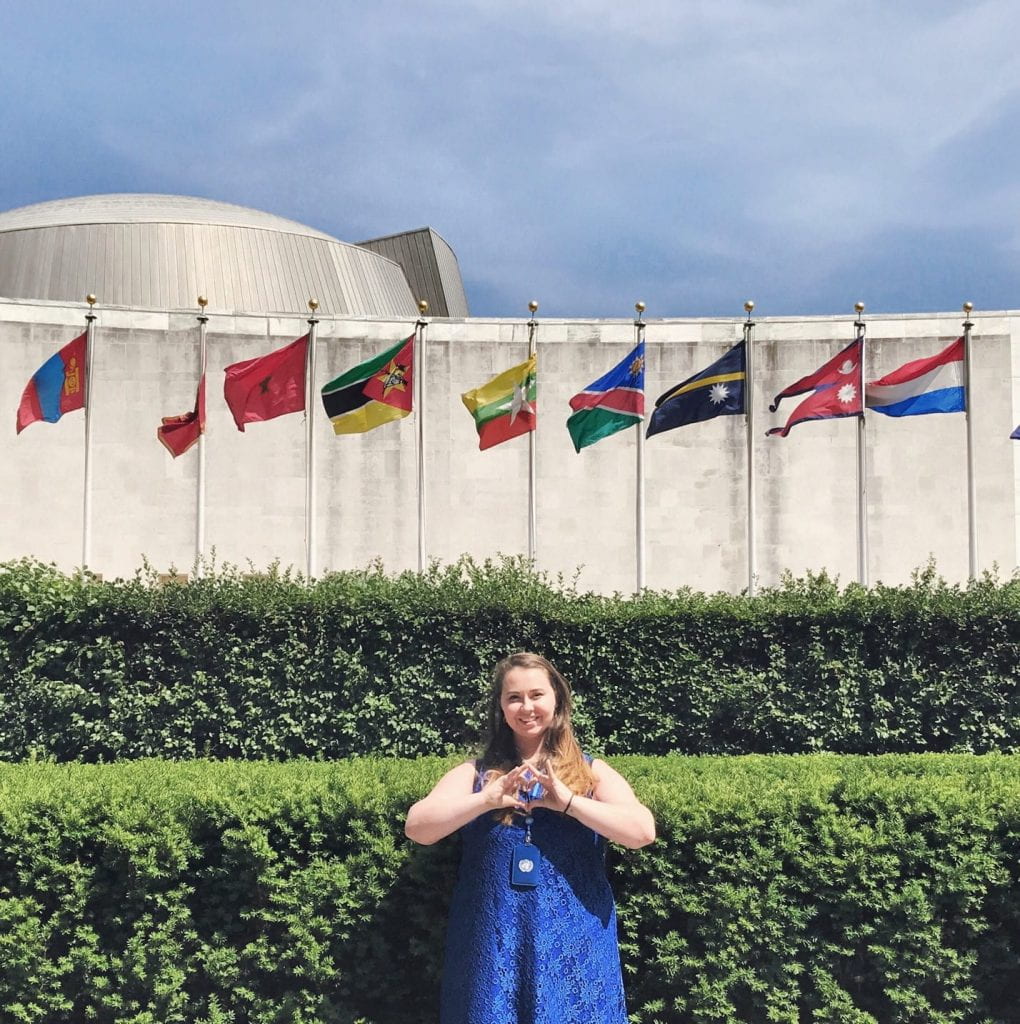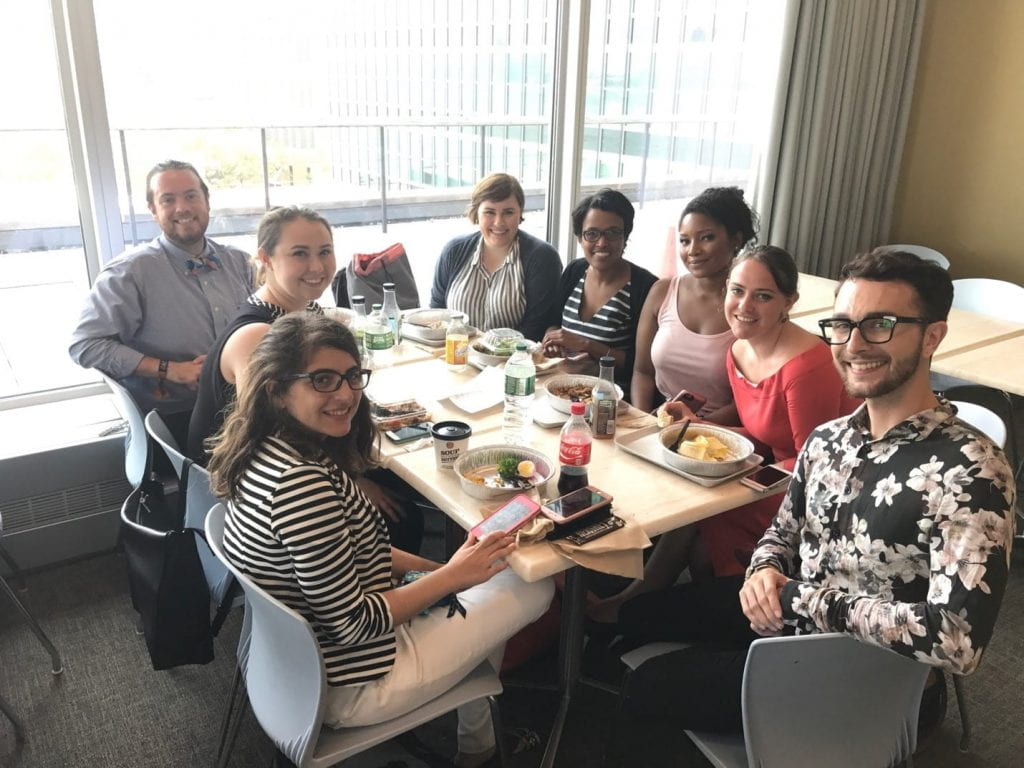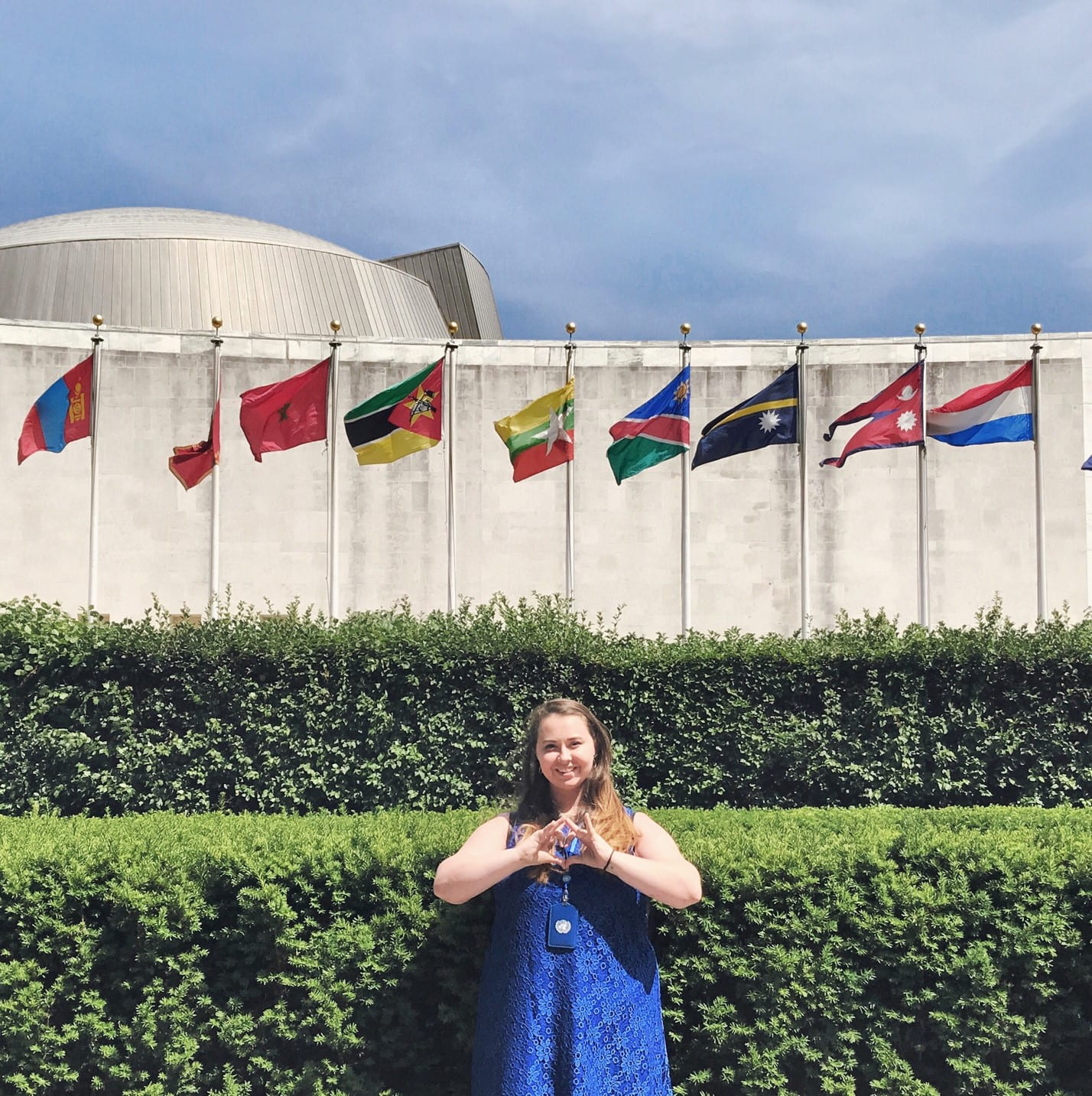* This is a repost from summer 2017

“The purpose of the present Convention is to promote, protect and ensure the full and equal enjoyment of all human rights and fundamental freedoms by all persons with disabilities, and to promote respect for their inherent dignity.” When I was hired by the UAB Institute for Human Rights, I never dreamed that we would take the trip to the United Nations for the 10th Convention of States Parties on the Convention on the Rights of Persons with Disabilities. Visiting the United Nations has always been a dream for me, but being able to take part in an international effort to promote disability rights was an unbelievable opportunity to me personally.
Disability has always intersected my life. My sister and I were born with Ehlers-Danlos Syndrome, which is basically a fancy way of saying that all the connective tissue in our bodies are about as stable as a limp noodle. Because of EDS, chronic pain is just a part of my life. I am unable to run, walk, or jump without a joint in my body threatening to dislocate. I suffer from sleep disorders and chronic fatigue along with a host of gastrointestinal issues. It also affects my heart and my autonomic nervous system; I tend to feel like a walking time bomb of anxiety, heart palpitations, and general malaise all wrapped up in a spaghetti-based body. I have lived my whole life without complaining for the most part. Most people in my life don’t know the extent of my disability, or even about it at all. I keep my pain hidden because I do not want anyone’s pity. I continue physically far beyond what my body’s real limits are because I do not want people to think I am lazy or helpless. It takes too much time to explain my disability to everyone I meet, so I deal with my pain with a smile on my face. This is the reality that most people with disabilities face—a life of “oh, I’m so sorry for you!” when they learn of your disability and “why can’t you do this?” when they do not understand your limits. My struggle as a woman with a disability is the reason why the Convention meant so much to me. Before the Convention, I had never in my life been around more than two people with disabilities or ever felt like anyone truly understood what I was going through. Seeing so many other people with disabilities raising their voices, sharing their pain and suffering, and demanding change gave me hope that one day I will no longer feel like I need to hide my disability.

I have always known that having a disability does not mean you cannot be strong and independent. Not being able to walk for long periods does not make me lazy, and my joint instability does not make me weak. I know these things, but sometimes the able-bodied world undermines these beliefs and makes me feel like I will never be good enough. The champions of disability rights who I met gave me such courage to fight those fears. The utter strength and bravery of these people were so encouraging to someone like me. I could see myself in Daniela Bas, the head of DESA and wheelchair user. Ms. Bas has managed to overcome so many obstacles as a woman with a disability yet constantly dazzles people with her charismatic personality and fierce intellect. Ms. Bas gave her knowledge on the importance of international cooperation in dismantling the cross-cutting barriers faced by women with disabilities. Her policy-based approach and political science background gave me hope that one day I could follow in her footsteps. Ms. Mia Farah, of the Lebanese Association for Self-Advocacy, gave me such encouragement from her passion, skills, and independence as a woman with Down Syndrome. Ms. Farah organized one of the most enjoyable and successful side events I attended, despite the challenges that her intellectual disability can bring. Her story of her successes resonated with me because I have always feared my limitations. Mia Farah showed me that limitations that others place on you because of your disability don’t have to define you.
I not only found inspiration during my time at the UN but a wealth of new knowledge as well. Every individual gave new insight on disability rights that I had never considered before. Natalie Draisin spoke on road safety for women and girls with disabilities, and how unsafe roads and transportation can be fatal—an important issue that many ignore when discussing disability rights. I was touched by the story of Flavia Cintra, a Brazilian journalist, whose doctor told her to abort because he believed that tetraplegics should never have children. Ms. Cintra shared how Brazilian mothers with disabilities often lose custody of their children and have their reproductive rights stolen from them through deceptive paperwork. Some wedding officiators even refuse to marry people paralyzed below the waist because they are believed to be unable to bear children. I never knew any of these issues before speaking with Ms. Cintra. As a reproductive rights activist, Ms. Cintra’s story made me understand the importance of including people with disabilities in our activism. All of the stories and experiences that were shared with me hit deeply and gave me such insight into international policies on disability rights.

The global environment for people with disabilities is harsh, whether one is in Brooklyn, Bogota, or Bangkok. All over the world, people with disabilities deal with compound discrimination, lack of adequate healthcare, limited access to resources, sexual abuse and assault, and the negation of their independence. Having this opportunity to partake in the implementation of policies on disability rights was genuinely life changing. Viewing the inner workings of the United Nations made me realize that I wanted to make a career in the international nonprofit organizations that work with the UN to effect change. It was incredible to see people from so many different places, all speaking in different languages. I could be listening to a speaker in Chinese, and put on a headset to have it translated live into French, Russian, English, and several more. Watching the sign language interpreters onstage during meetings was so thrilling— not only was it beautiful to watch, it also was critical in making the events accessible to the deaf and hard of hearing. These events made me realize how necessary sign language is to have a successful career in advocacy, because the inclusion of nonverbal people is vital. I will always look back on this trip to the United Nations as the moment when I found my calling. As I have always tried to ignore my disability, I had never realized until now how central disability rights are to my life. Being around such fearless role models brought to life a passion to fight for the rights of women and girls with disabilities around the world.

